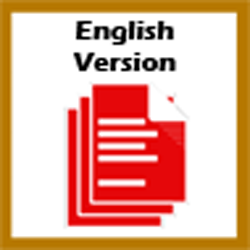Editorial Policies
Editorial Policies>> Focus and Scope>> Section Policies>> Peer Review Process>> Publication Frequency>> Open Access Policy>> Archiving>> Publication Ethics>> Plagiarism Chek>> Reference Management>> Copy Editing and Proofreading>> Retraction |
Focus and ScopeThis journal focuses its scope on the issue of Islamic Education in Indonesia. We invite scientists, scholars, researchers, and professionals in the field of Islamic Education in Indonesia to publish their research results in our journal.
|
Section Policies |
Peer Review ProcessIn the process of uploading the script the author is done online. First the author creates an account as an author first then uploads the manuscript. the review process was carried out by reviewers of the Hadlonah journal and was carried out online in several stages. The writings of the authors that have been corrected by reviewers and the results of improved writings are uploaded and managed in this journal system. The process of accepting written manuscripts needs to pay attention to the following policies. |
Publication FrequencyEducation Journal : Islamic Education Journal Publish two times a year in March and September |
Open Acces Policy |
Archiving |
Publication EthicEthical standards for publication exist to ensure high-quality scientific publications, public trust in scientific findings, and that people receive credit for their work and ideas. Lembaga Publikasi Ilmiah Bunga Bangsa is a member of the Committee on Publication Ethics (COPE) and aims to adhere to its guidelines and core practices. >> Article Assessment All manuscripts are subject to peer review and are expected to meet standards of academic excellence. If approved by the editor, submissions will be considered by peer reviewers, whose identities will remain anonymous to the authors. Our Research Integrity team will occasionally seek advice outside standard peer review, for example, on submissions with serious ethical, security, biosecurity, or societal implications. We may consult experts and the academic editor before deciding on appropriate actions, including but not limited to recruiting reviewers with specific expertise, assessment by additional editors, and declining to further consider a submission. >> Plagiarism Authors must not use the words, figures, or ideas of others without attribution. All sources must be cited at the point they are used, and reuse of wording must be limited and be attributed or quoted in the text. Lembaga Publikasi Ilmiah Bunga Bangsa uses Crossref Similarity Check (iThenticate) and our own software to detect submissions that overlap with published and submitted manuscripts. Manuscripts that are found to have been plagiarized from a manuscript by other authors, whether published or unpublished, will be rejected and the authors may incur sanctions. Any published articles may need to be corrected or retracted. >> Duplicate Submission and Redundant Publication Lembaga Publikasi Ilmiah Bunga Bangsa journals consider only original content, i.e. articles that have not been previously published, including in a language other than English. Articles based on content previously made public only on a preprint server, institutional repository, or in a thesis will be considered. Manuscripts submitted to Lembaga Publikasi Ilmiah Bunga Bangsajournals must not be submitted elsewhere while under consideration and must be withdrawn before being submitted elsewhere. Authors whose articles are found to have been simultaneously submitted elsewhere may incur sanctions. If authors have used their own previously published work, or work that is currently under review, as the basis for a submitted manuscript, they must cite the previous articles and indicate how their submitted manuscript differs from their previous work. Reuse of the authors’ own words outside the Methods should be attributed or quoted in the text. Reuse of the authors’ own figures or substantial amounts of wording may require permission from the copyright holder and the authors are responsible for obtaining this. Lembaga Publikasi Ilmiah Bunga Bangsajournals will consider extended versions of articles published at conferences provided this is declared in the cover letter, the previous version is clearly cited and discussed, there is significant new content, and any necessary permissions are obtained. Redundant publication, the inappropriate division of study outcomes into more than one article (also known as salami slicing), may result in rejection or a request to merge submitted manuscripts, and the correction of published articles. Duplicate publication of the same, or a very similar, article may result in the retraction of the later article and the authors may incur sanctions. >> Citation Manipulation Authors whose submitted manuscripts are found to include citations whose primary purpose is to increase the number of citations to a given author’s work, or to articles published in a particular journal, may incur sanctions. Editors and reviewers must not ask authors to include references merely to increase citations to their own or an associate’s work, to the journal, or to another journal they are associated with. >> Fabrication and Falsification The authors of submitted manuscripts or published articles that are found to have fabricated or falsified the results, including the manipulation of images, may incur sanctions, and published articles may be retracted. >> Conflict of Interest Conflicts of interest (COIs, also known as ‘competing interests’) occur when issues outside research could be reasonably perceived to affect the neutrality or objectivity of the work or its assessment. This can happen at any stage in the research cycle, including during the experimentation phase, while a manuscript is being written, or during the process of turning a manuscript into a published article. If unsure, declare a potential interest or discuss with the editorial office. Undeclared interests may incur sanctions. Submissions with undeclared conflicts that are later revealed may be rejected. Published articles may need to be re-assessed, have a corrigendum published, or in serious cases be retracted. For more information on COIs, see the guidance from the ICMJE and WAME. Conflicts of interest do not always stop work from being published or prevent someone from being involved in the review process. However, they must be declared. A clear declaration of all possible conflicts – whether they actually had an influence or not – allows others to make informed decisions about the work and its review process. If conflicts of interest are found after publication, this may be embarrassing for the authors, the Editor and the journal. It may be necessary to publish a corrigendum or reassess the review process. Conflicts include the following:
>> Authors Authors must declare all potential interests in a ‘Conflicts of interest’ section, which should explain why the interest may be a conflict. If there are none, the authors should state “The author(s) declare(s) that there are no conflicts of interest regarding the publication of this paper.” Submitting authors are responsible for coauthors declaring their interests. Authors must declare current or recent funding (including article processing charges) and other payments, goods or services that might influence the work. All funding, whether a conflict or not, must be declared in the ‘Funding Statement’. The involvement of anyone other than the authors who 1) has an interest in the outcome of the work; 2) is affiliated to an organization with such an interest; or 3) was employed or paid by a funder, in the commissioning, conception, planning, design, conduct, or analysis of the work, the preparation or editing of the manuscript, or the decision to publish must be declared. Declared conflicts of interest will be considered by the editor and reviewers and included in the published article. >> Editors and Reviewers Editors and reviewers should decline to be involved with a submission when they
Reviewers must declare any remaining interests in the ‘Confidential’ section of the review form, which will be considered by the editor. Editors and reviewers must declare if they have previously discussed the manuscript with the authors. >> Sanctions If Lembaga Publikasi Ilmiah Bunga Bangsabecomes aware of breaches of our publication ethics policies, whether or not the breach occurred in a journal published by Lembaga Publikasi Ilmiah Bunga Bangsa, the following sanctions may be applied across the Lembaga Publikasi Ilmiah Bunga Bangsajournals:
Lembaga Publikasi Ilmiah Bunga Bangsa may apply additional sanctions for severe ethical violations. >> Investigations Suspected breaches of our publication ethics policies, either before and after publication, as well as concerns about research ethics, should be reported to our Research Integrity team, overseen by the Head of Research Integrity. Claimants will be kept anonymous if requested, though claimants may also wish to use an anonymous email service such as ProtonMail or TorGuard. Lembaga Publikasi Ilmiah Bunga Bangsa may ask the authors to provide the underlying data and images, consult editors, and contact institutions or employers to ask for an investigation or to raise concerns. >> Corrections and retractions When errors are identified in published articles, the publisher will consider what action is required and may consult the editors and the authors’ institution(s). Errors by the authors may be corrected by a corrigendum and errors by the publisher by an erratum. If there are errors that significantly affect the conclusions or there is evidence of misconduct, this may require retraction or an expression of concern following the COPE Retraction Guidelines. All authors will be asked to agree to the content of the notice. |
Plagiarism Chekthe plagiarization system in this journal uses the plagiarism checker application |
References Managementcitation and writing of bibliography in this journal article using the mendeley application |
Copy editing and proofreading |
Retraction |


























